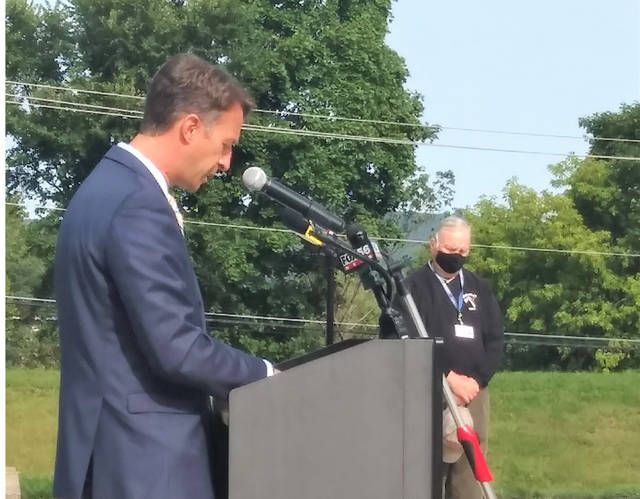
Small businesses and nonprofit organizations hurt by the coronavirus pandemic can now apply for Luzerne County’s relief funding through a program county Manager C. David Pedri announced outside the courthouse two weeks ago.
File photo
Click here to subscribe today or Login.
Small businesses and nonprofit organizations hurt by the coronavirus pandemic can now apply for Luzerne County’s relief funding, county Manager C. David Pedri announced Thursday.
The county is allocating $11 million of its federal Coronavirus Aid, Relief and Economic Security (CARES) Act funding to the outside entities — $8 million to businesses and $3 million for nonprofits.
Pedri announced the online portal application process two weeks ago so businesses and nonprofits could start determining if they are eligible and rounding up required paperwork.
Accessible through a link on the main page at luzernecounty.org, the portal will remain open for applications until midnight Oct. 14.
Small businesses and nonprofits are the “heart of Luzerne County,” providing support to communities and employing many, Pedri said in a release.
“If these businesses fail, the whole community will be impacted by their loss. Luzerne County will be here when this pandemic is over, and these grants will make sure that our small businesses and non-profits will be here as well,” Pedri said.
Information on eligibility and necessary documentation is available through the portal and can be translated into any language using Google Translate, the release said. A bilingual call center has also been set up for those with additional questions at 1-888-604-4782.
The regional economic development organization Penn’s Northeast will help administer the county program, with support from the Community First Fund. Penn’s Northeast President/CEO John Augustine said his organization is “thrilled to be a partner in this program,” the release said.
Qualifications
To be eligible, businesses must have a physical operation based in the county, 15 or fewer full-time employees and annual revenues of $500,000 or less prior to March 1, 2020.
Applicants will be deemed ineligible if they are in active default on government taxes or fees or engaged in services that are “socially undesirable” or that “may be considered predatory in nature,” the county said, citing pawnshops, rent-to-own and check-cashing businesses and adult bookstores as examples.
Among other types of ineligible businesses: those primarily engaged in political or lobbying activities and private clubs/establishments that limit membership for reasons other than capacity.
Nonprofits must be tax-exempt, have a primary physical operation in the county and attest that at least half of their annual pre-pandemic revenues came from programs or services provided to disabled or low/moderate-income county residents focused on homelessness, childcare, employment, transportation, health care, workforce development and/or food and housing security.
The nonprofits must be in good standing with the Pennsylvania Department of State and can be structured as an unincorporated association, trust, corporation or limited liability company.
As with businesses, some conditions can make a nonprofit ineligible.
For example, the nonprofits can’t be controlled by a board member/officer who is delinquent or has defaulted the last seven years on a direct or guaranteed loan from Pennsylvania or any federal agency.
Also barred from consideration are nonprofit private clubs that limit memberships for reasons other than capacity.
To be fair, the county is equally allocating the funds based on the total number of qualified applicants, which ensures everyone receives the same amount and eliminates fears those filing later in the two-week window will be shut out or disadvantaged, officials have said.
Funds must be used for costs incurred between March 1 and Dec. 30 due to the pandemic, including payroll and insurance, some mortgage and debt, rent and utilities and specialized coronavirus prevention equipment and training.
Reach Jennifer Learn-Andes at 570-991-6388 or on Twitter @TLJenLearnAndes.




